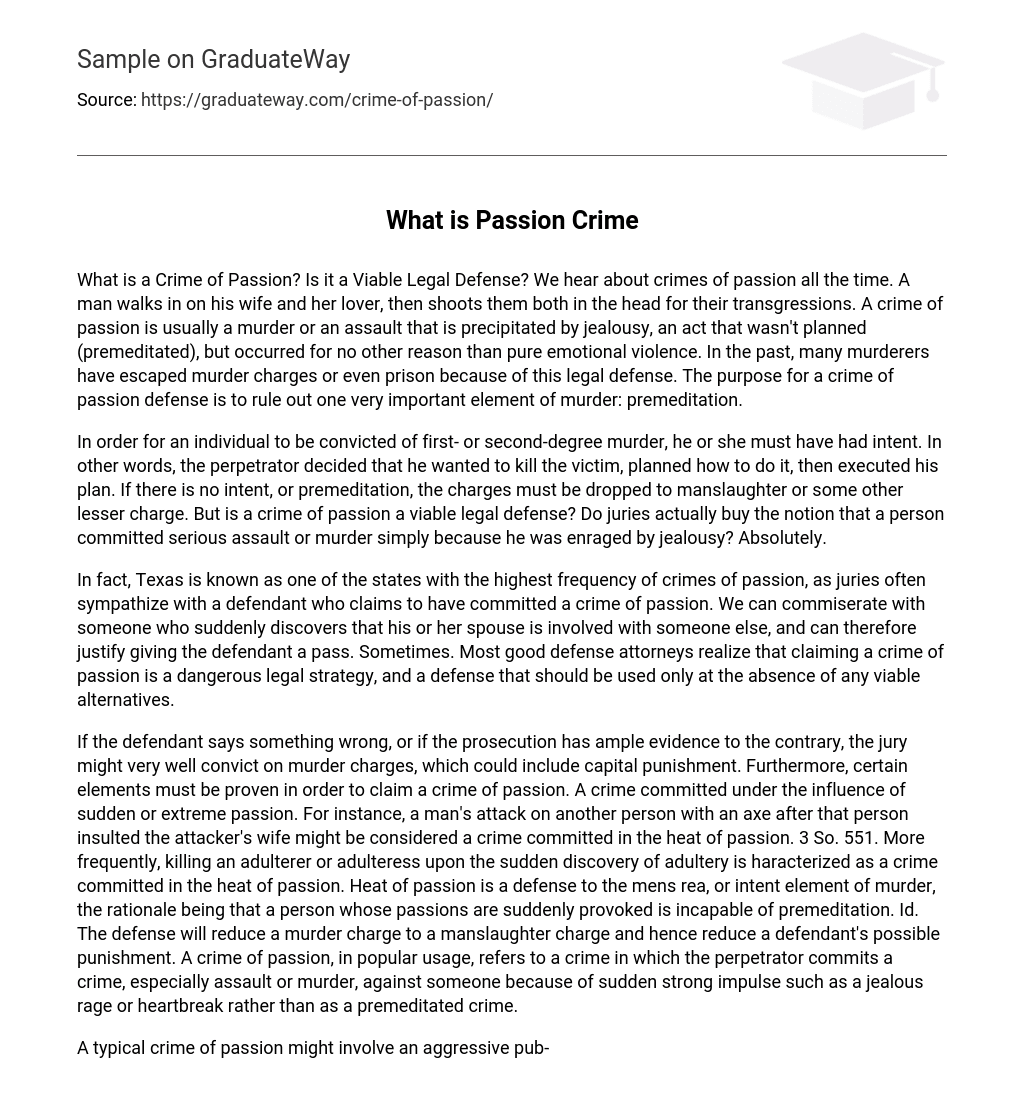What is a Crime of Passion? Is it a Viable Legal Defense? We hear about crimes of passion all the time. A man walks in on his wife and her lover, then shoots them both in the head for their transgressions. A crime of passion is usually a murder or an assault that is precipitated by jealousy, an act that wasn’t planned (premeditated), but occurred for no other reason than pure emotional violence. In the past, many murderers have escaped murder charges or even prison because of this legal defense. The purpose for a crime of passion defense is to rule out one very important element of murder: premeditation.
In order for an individual to be convicted of first- or second-degree murder, he or she must have had intent. In other words, the perpetrator decided that he wanted to kill the victim, planned how to do it, then executed his plan. If there is no intent, or premeditation, the charges must be dropped to manslaughter or some other lesser charge. But is a crime of passion a viable legal defense? Do juries actually buy the notion that a person committed serious assault or murder simply because he was enraged by jealousy? Absolutely.
In fact, Texas is known as one of the states with the highest frequency of crimes of passion, as juries often sympathize with a defendant who claims to have committed a crime of passion. We can commiserate with someone who suddenly discovers that his or her spouse is involved with someone else, and can therefore justify giving the defendant a pass. Sometimes. Most good defense attorneys realize that claiming a crime of passion is a dangerous legal strategy, and a defense that should be used only at the absence of any viable alternatives.
If the defendant says something wrong, or if the prosecution has ample evidence to the contrary, the jury might very well convict on murder charges, which could include capital punishment. Furthermore, certain elements must be proven in order to claim a crime of passion. A crime committed under the influence of sudden or extreme passion. For instance, a man’s attack on another person with an axe after that person insulted the attacker’s wife might be considered a crime committed in the heat of passion. 3 So. 551. More frequently, killing an adulterer or adulteress upon the sudden discovery of adultery is haracterized as a crime committed in the heat of passion. Heat of passion is a defense to the mens rea, or intent element of murder, the rationale being that a person whose passions are suddenly provoked is incapable of premeditation. Id. The defense will reduce a murder charge to a manslaughter charge and hence reduce a defendant’s possible punishment. A crime of passion, in popular usage, refers to a crime in which the perpetrator commits a crime, especially assault or murder, against someone because of sudden strong impulse such as a jealous rage or heartbreak rather than as a premeditated crime.
A typical crime of passion might involve an aggressive pub-goer who assaults another guest following an argument or a husband who discovers his wife has made him a cuckold and proceeds to brutally batter or even kill his wife or the man with whom she was involved. Women, as well as men, can commit crimes of passion. In the United States civil courts, a crime of passion is referred to as temporary insanity. This defense was first used by U. S.
Congressman Daniel Sickles of New York in 1859 after he had killed his wife’s lover, Philip Barton Key, but was most used during the 1940s and 1950s. In some countries, notably France, crime passionnel (or crime of passion) was a valid defense during murder cases; during the 19th century, some cases could be a custodial sentence for two years for the murderer, while the spouse was dead; this ended in France as the Napoleonic code was updated in the 1970s so that a specific father’s authority upon his whole family was over.





